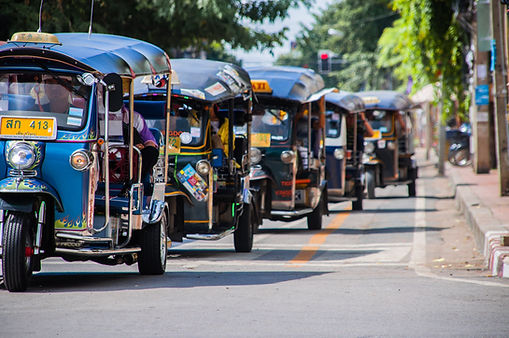
Thailand
At a Glance
From the bustling streets of Bangkok and the ancient ruins of Ayutthaya to the sun-drenched beaches of Phuket and the misty mountains of Chiang Mai, Thailand is a dazzling blend of culture, cuisine, adventure, and tropical escape. Travelers should protect against mosquito-borne illnesses such as dengue fever and Japanese encephalitis, especially during the rainy season and in rural, coastal, or jungle areas. Tap water isn’t safe to drink, and smart choices with street food — like picking busy stalls serving freshly cooked meals — help lower the risk of foodborne illness. Motorbikes offer a popular but often risky way to explore, particularly on island roads and in fast-paced city traffic. Packing a well-equipped travel health kit, using effective insect protection, making careful food and water choices, and staying aware of environmental hazards will help ensure your journey through Thailand is not only unforgettable, but safe, relaxed, and full of discovery.

Thailand thrills with temples, street food, and island bliss. Avoid tap water, stay cool in the heat, and dodge the mozzies with smart prep.

Don't Leave Without These
Get access to curated, pharmacist-reviewed packing guides, tailored to destinations like Cambodia, Vietnam, and Thailand — including brand names, specific combinations, and practical tips you won’t find in a generic travel article.
[Join the Travel Health Hub community]
Go-to travel health essentials — practical, proven, and always packed.
🦟 Mosquito Protection
Include repellent with 30–50% DEET, anti-itch cream, long-sleeved clothing, and mosquito nets if staying in basic or rural accommodation. Malaria tablets are strongly recommended — speak to your doctor about options like doxycycline or atovaquone-proguanil.
💩 Tummy Troubles Toolkit
Bring loperamide, oral rehydration salts (ORS), an antacid, and a short course of azithromycin for traveller’s diarrhoea. “Bali Belly” is common — prepare early, not when it’s too late. Hand sanitiser and wet wipes are essential when eating on the go or using roadside facilities.
☀️ Sun & Skin Care
Pack high-SPF sunscreen (50+), SPF lip balm, and hand sanitiser with 60–70% alcohol. Choose quick-dry, fragrance-free products to suit the heat and humidity.
🩹 First Aid & Docs
Include antiseptic solution, gauze, adhesive dressings, blister pads, gloves, and a thermometer. Bring a printed medical summary, prescriptions with generic names, and your travel insurance documents — including emergency evacuation coverage.
💊 Comfort & Care
Pack paracetamol or ibuprofen for pain, fever, and post-flight aches. Include an antihistamine for bites or allergies, and a basic cold & flu remedy. Consider Berocca, Hydralyte, or Hairy Lemon for hangover recovery or general energy support — they’re handy in the heat, especially after long beach days or Bali nights.
🔥 Extra Tip
In Thailand, busy days of temple-hopping and street market walking mean sore feet are common. Pack blister pads, comfortable walking shoes, and rehydration salts to recover quickly in the tropical heat.
Prep Well. Travel Well. Know the Risks.
Thailand offers vibrant cities, stunning beaches, lush mountains, and a world-renowned food scene—but travellers should be aware of some important health considerations. Healthcare standards are excellent in Bangkok, Phuket, and Chiang Mai, but access to quality care may be limited in more remote provinces and islands. Comprehensive travel insurance that includes medical evacuation is strongly recommended.
Mosquito-borne diseases such as dengue fever and chikungunya are common, particularly during the rainy season (May–October). Malaria is rare in major tourist areas but persists in some remote forested regions near the borders. Insect repellent, protective clothing, and mosquito nets are essential precautions.
Heat-related illnesses such as sunburn, heat exhaustion, and dehydration are common, especially during the hot season (March–May) and at beach destinations. Hydration, sun protection, and pacing activities are crucial, particularly during outdoor excursions and festivals.
Water-related injuries are a risk, especially when swimming, diving, or snorkelling around Thailand’s many islands. Coral cuts, ear infections (swimmer’s ear), and sun overexposure are frequent complaints. Minor reef injuries should be cleaned promptly to prevent infection, and divers should avoid pushing their depth or flying too soon after diving to reduce the risk of decompression sickness.
Rabies is endemic, and bites from street dogs or monkeys (especially at tourist spots like temples) require urgent medical attention. Pre-travel rabies vaccination is recommended for long stays, remote travel, or outdoor adventure activities.
Road safety is a significant concern. Motorbike accidents are a leading cause of serious injury among tourists, especially on islands and coastal towns. Helmets, insurance, and caution are essential when riding or hiring motorbikes.
With smart preparation, Thailand remains an incredibly rewarding and unforgettable destination for health-conscious travellers.

Eat Adventurously, Not Regretfully
Thailand’s cuisine is one of the world’s most celebrated—fragrant, spicy, and deeply tied to local culture. Dishes like green curry, pad Thai, tom yum goong (hot and sour soup), and endless varieties of stir-fried rice and noodles fill bustling street markets and night bazaars across the country.
Despite the popularity of chopsticks among visitors, most Thais traditionally eat rice-based dishes with a fork and spoon, using the fork to push food onto the spoon. Chopsticks are typically reserved for noodle soups and dishes influenced by Chinese cuisine.
Fruit is everywhere—sweet mangoes, rambutans, mangosteens, and the infamous durian, known as the "King of Fruits." Durian’s pungent smell and rich, custard-like texture divide opinion, but it remains a sought-after delicacy across Thailand.
Salads, known as yam, are a cornerstone of Thai dining. They blend fresh herbs, lime, chilli, fish sauce, and often seafood, noodles, or meats into bright, vibrant dishes. While delicious, travellers should be mindful that salads may be washed with unfiltered tap water, especially at small food stalls. Always choose salads made fresh to order at busy vendors or established restaurants.
Seafood is widely enjoyed across Thailand, particularly along the coasts and islands. While it’s often incredibly fresh, travellers should be aware that eating undercooked or raw seafood carries a risk of hepatitis A, as well as other foodborne illnesses. Hepatitis A vaccination is strongly recommended for all travellers.
Fruit juices are popular and refreshing in Thailand’s tropical heat, but they can carry hidden risks if water or ice is added. Stick to juices made fresh in front of you and always check whether ice has been added. Commercially bottled juices are a safer choice when exploring rural areas.
Food hygiene standards vary—street food in cities like Bangkok and Chiang Mai is generally safe if you stick to hot, freshly cooked meals from busy stalls. Avoid foods that have been sitting out for long periods, particularly seafood and pre-prepared salads.
With a little care and smart choices, travellers can fully enjoy Thailand’s vibrant, unforgettable cuisine—a true highlight of any journey.
Beyond the Basics: Unique Health Risks
Every destination has its own surprises. Here are the health risks that don’t always make it into standard travel advice—but are important to know before you go.

While Thailand’s temples, parks, and coastal towns are filled with charm, they are also home to thriving monkey populations—and interactions with these animals can pose serious health risks for travellers.
Monkeys may seem playful or tame, but they are wild animals that can bite or scratch without warning, especially if food is offered or if they feel threatened.
Bites and scratches can transmit rabies, a life-threatening viral infection, and other dangerous bacterial infections.
Popular tourist sites like Lopburi's Monkey Temple, Monkey Beach in Phi Phi Islands, and parts of Phuket and Krabi have known incidents of monkey aggression toward visitors. Even a minor scratch can be enough to transmit infection.
Travellers can reduce their risk by:
Avoiding feeding or approaching monkeys.
Keeping food, water bottles, and shiny objects hidden.
Remaining calm and backing away slowly if monkeys approach.
Pre-travel rabies vaccination is strongly recommended for travellers planning extended stays, rural travel, or activities around animals.
If bitten or scratched, wash the wound immediately with soap and water for at least 15 minutes and seek urgent medical care for post-exposure prophylaxis.

Photo for editorial purposes only. Not affiliated with any specific provider.
When it doesn't go to plan
Thailand offers a high standard of healthcare, especially in major cities like Bangkok, Chiang Mai, and popular tourist centres such as Phuket. Private hospitals are modern, well-equipped, and have English-speaking medical staff. Public hospitals also provide quality care but may be more crowded and have longer waiting times.
Travellers can access excellent medical care at facilities such as:
Bumrungrad International Hospital (Bangkok)
Bangkok Hospital (multiple locations)
Samitivej Sukhumvit Hospital (Bangkok)
Bangkok Hospital Phuket
Thailand is also a popular destination for medical tourism, offering a wide range of procedures at competitive prices. However, travel insurance covering medical expenses and medical evacuation is still strongly recommended, particularly for emergencies or complex care.
Pharmacies are widespread, affordable, and generally well-stocked in Thailand, especially in tourist areas. However, some over-the-counter drugs may differ in quality or dosage from Australian equivalents.
Travellers should carry a full supply of regular prescription medications, along with scripts listing the generic names, and be cautious when purchasing medications from small or unregulated outlets.
Refer to SmartTraveller.gov.au or the Australian Embassy in Bangkok for the latest travel health advice before departure.

Before you go
Thailand’s vibrant cities, jungles, and beaches mean varied travel risks. Ensure your routine vaccinations are up to date before exploring.
Essential Routine Vaccines
All travellers should be up to date with:
Measles-Mumps-Rubella (MMR)
Diphtheria, Tetanus, and Pertussis (Tdap)
Polio
Chickenpox (Varicella)
Influenza (seasonal flu)
COVID-19 (including booster doses if eligible)
Infants may need early MMR and Hepatitis A protection for travel.
Recommended Travel Vaccines
Recommended for most travellers:
Hepatitis A – Common food and water risk.
Hepatitis B – Important for all travellers, particularly for longer stays.
Typhoid – Riskier with street food or rural travel.
Japanese Encephalitis (JE) – Advised for stays longer than a month, or during the rainy season in rural areas.
Rabies – Recommended for rural travel, outdoor activities, or contact with animals (especially monkeys at temples).
Chikungunya – Emerging risk; vaccine considered for older travellers staying long term.
Yellow Fever – Entry Requirement
Proof of yellow fever vaccination is needed if arriving from a yellow fever-risk country.
.png)
🎒 Travel should be an adventure — not a health risk.
With the right advice, you can manage chronic conditions, complex medications, and health risks confidently on the road.
Book your Travel Health Consult and set yourself up for a healthier, safer journey.

Traffic Trouble: More Than Just a Travel Inconvenience
Road conditions in Thailand vary widely. Major highways and city roads are generally in good condition, but rural roads, small towns, and island routes can be poorly maintained, narrow, and hazardous—especially during or after heavy rains.
Motorbike and scooter accidents are a leading cause of injury and death among travellers, particularly on popular islands like Phuket, Koh Samui, and Koh Phangan. Many tourists hire motorbikes without helmets, insurance, or a valid motorcycle licence, which may invalidate travel insurance in the event of an accident.
Traffic in cities like Bangkok can be highly congested, and local driving behaviour—while improving—remains unpredictable. Pedestrian crossings are not always observed, and scooters frequently weave between traffic. Night-time driving carries additional risks due to poorly lit rural roads and a higher chance of encountering impaired drivers.
Travellers should avoid hiring motorbikes unless they are licensed, experienced, and properly insured. Helmets should always be worn, even for short trips. Use reputable taxis, hotel transfers, or rideshare services like Grab for safer urban transport.
If planning road trips or inter-island travel, allow extra time for delays and always carry travel insurance that covers vehicle accidents and medical evacuation. Careful planning and cautious transport choices can greatly reduce travel risks in Thailand.

Weather
Thailand has three main seasons: hot (March–May), rainy (June–October), and cool dry (November–February).
Temperatures range from 25–35°C, often reaching their peak in April before the monsoon rains arrive.
The rainy season brings intense, brief afternoon storms, increased mosquito-borne illnesses like dengue, and occasional flooding, especially in Bangkok and low-lying areas.
Sun exposure is intense year-round, and heat exhaustion is common among travellers adjusting to the tropical conditions.
In northern Thailand, cooler nights are typical during December and January.
Exploring Without Limits: Travel and Chronic Conditions
)%20(1).png)
Join our members-only section for trusted, personalised advice on managing diabetes, heart health, arthritis, and more while travelling the world.
Access expert tips crafted for travellers living with chronic health conditions—because smart preparation leads to smoother, safer adventures.
Stay confident, travel protected, and make the most of every journey with tailored health strategies designed to go wherever you do.
Travel Well Extras
Cutaneous Larva Migrans and Filarial Infections
Thailand’s beaches and rural areas are beautiful but can harbour hidden risks. Cutaneous larva migrans is a skin infection caused by hookworm larvae found in contaminated sand or soil—often from stray dogs and cats. It appears as an itchy, winding rash that moves under the skin.
Filarial infections are another rare but serious risk, transmitted by mosquitoes in rural areas. These parasites can cause swelling, fever, and lymphatic system damage if untreated.
Practical Advice:
Avoid walking barefoot on beaches or muddy ground.
Sleep under mosquito nets in rural areas.
Seek medical attention if unusual rashes or swelling develop after travel.